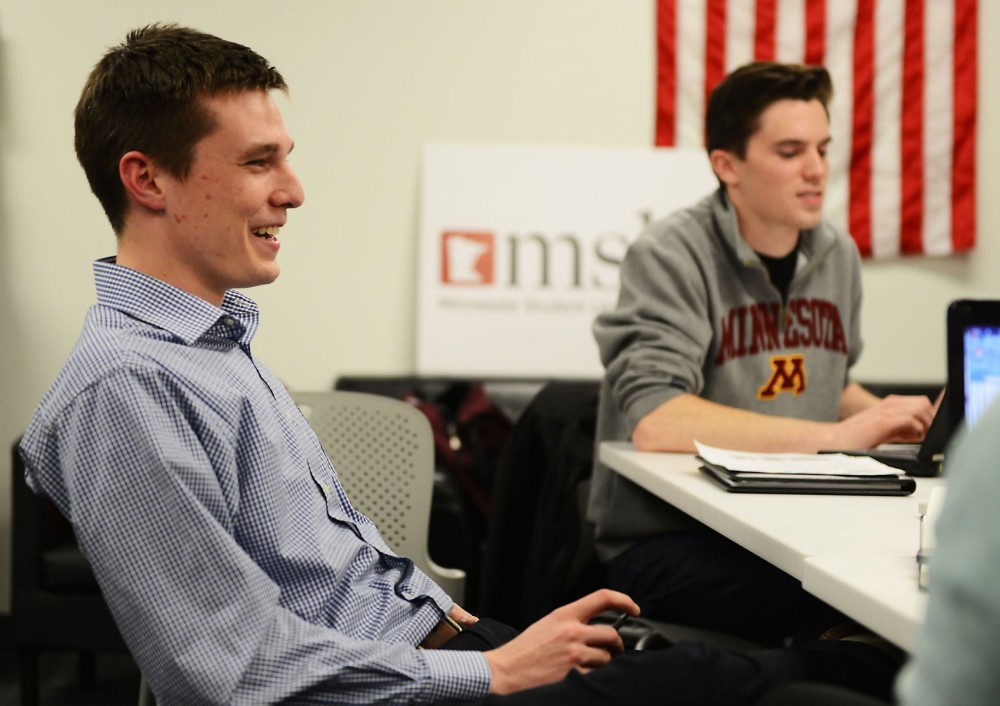Matt Forstie had a keen eye for politics and current events from a young age. Growing up in Rochester, Minn., Lori Forstie said her son read the newspaper every day.
The finance senior joined five student groups when he came to the University of Minnesota in fall 2010. But only one stuck — the Minnesota Student Association.
Forstie said he stayed in the undergraduate student government because he felt it was the best way to make an impact. Now as chairman of the Minnesota Student Legislative Coalition, Forstie has helped ramp up MSA’s efforts at the state Legislature, and students and officials say MSA has more impact at the Capitol than ever before.
When he joined MSA, Forstie noticed student advocacy efforts lacked tangible goals for University students, calling the efforts more reactionary than proactive.
“Looking back, it’s almost criminal how little we were doing at the state Capitol in terms of advocacy,” he said. “But I knew all it would really take is a couple of people to decide that we could do better to change that.”
With Forstie at the helm, the MSLC drafted and lobbied for the state’s medical amnesty law, which protects underage drinkers from citations when they call 911 in a medical emergency. The group lobbied for the bill during the spring legislative session, and the governor signed it into law in May.
Rep. Kim Norton, DFL-Rochester, has known Forstie since he was in high school. She said MSA’s boosted presence at the Capitol and unprecedented lobbying efforts have upped the group’s credibility among lawmakers.
“It’s been obvious that students at the University are serious about their mission,” she said. “They have built their own credibility by having a strong presence [at the Capitol] and understanding a wide variety of issues.”
Forstie has been MSLC chairman since fall of his junior year. He oversees and coordinates student advocacy efforts for all five University of Minnesota campuses, responsibilities that include planning Support the U Day every spring and drafting an advocacy platform for each legislative session.
Last year, Forstie and the MSLC advocated for medical amnesty, open textbooks and the tuition freeze for resident undergraduates.
Forstie said University students had more than 250 meetings with legislators last session, which he said was the biggest student advocacy effort the MSLC has ever led.
“Legislative advocacy has just been a natural thing for Matt,” Lori Forstie said. “I think he was just unique in that he kind of had a drive to follow his interest in what’s going on in the world.
Next session, the MSLC will advocate for University bonding projects, open-source textbooks and changes to the Higher Education Act during its reauthorization this year.
Forstie said his experience lobbying and testifying in legislative hearings during his freshman and sophomore year helped him develop relationships with lawmakers and learn how advocacy could become a tool to improve student life at the University.
Lori Forstie said her son has been comfortable reaching out to community leaders ever since he lived at home in Rochester.
“Matt never really felt he needed to become an adult before he could get started on something,” she said. “He has a great ability to make connections and surround himself with like-minded people and figure out how to get involved.”
MSLC founder Chris Tastad said he saw potential in Forstie early on.
“He displayed the work ethic, high-level knowledge and communication skills that you want in somebody leading the student body at the Capitol,” Tastad said.
As Forstie has seen the power of advocacy at work, he said he has realized it’s important to teach others the craft.
He said he hopes his work inspires the next group of students to approach legislative advocacy as a tool to help solve issues and make the University a better place.
“We’re a part of a generation that’s facing a lot of financial, economic and social challenges,” he said. “Using advocacy as a tool and spreading awareness of that tool to people will naturally help our generation overcome these problems.”


